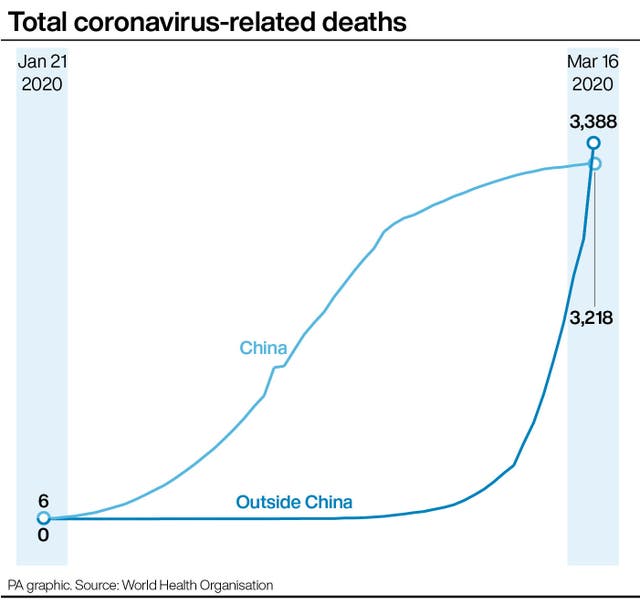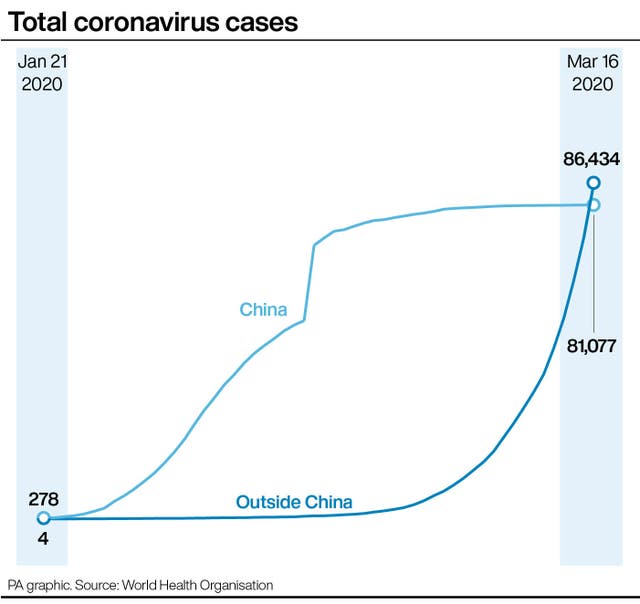The Euro 2020 football tournament has been postponed and Britons have have been advised against all non-essential trips abroad as the fallout from the coronavirus pandemic continues.
Chancellor Rishi Sunak is due to unveil help for businesses amid warnings that many enterprises both large and small are on the brink of collapse.
But that help will come too late for some, including fashion chain Laura Ashley, which filed for administration, putting up to 2,700 jobs at risk, after rescue talks were halted by the coronavirus outbreak.
The Airport Operators Association also warned that UK airports may shut down “within weeks without government intervention”.
Despite that warning, foreign secretary Dominic Raab told MPs the government was advising against all non-essential foreign travel for an initial period of 30 days.
Raab said: “UK travellers abroad now face widespread international border restrictions and lockdowns in various countries.
“The FCO [Foreign Office] will always consider the safety and the security of British nationals so with immediate effect I’ve taken the decision to advise British nationals against non-essential travel globally for an initial period of 30 days and of course subject to ongoing review.”
Today, Archbishop @JohnSentamu and I are calling @churchofengland to suspend public worship to help stem the spread of #coronavirus. We must be a radically different church for now – but one that’s hopeful, prayerful and committed to serving others: https://t.co/cU8ZQIdzcb
— Archbishop of Canterbury (@JustinWelby) March 17, 2020
That news came as:
– The Church of England announced that public worship is “suspended until further notice” although weddings and funerals can still go ahead
– Ofsted inspections were suspended and the largest education union demanded the prime minister closes all schools “at least for some time and at least in some areas”.
– It emerged that Uefa has decided to postpone the European Championship until 2021
– The Queen’s garden parties at Buckingham Palace were cancelled along with the Chelsea Flower Show and other RHS events
– The National Association of Funeral Directors met with the Cabinet Office to discuss how its members “can cope with extra number of deaths” caused by Covid-19″
– Cinemas across the country announced widespread closures until further notice including cinemas owned by Odeon, Vue and Cineworld and Picturehouse.
The further signs of a general shut down came after scientists said the UK had “no time to lose” in changing tactics in order to prevent thousands of deaths and the NHS being overwhelmed.
The Imperial College Covid-19 response team – which is one of several scientific teams advising ministers – published a paper showing that 250,000 people could die if efforts were focused only on delaying and slowing down the spread of Covid-19.
The paper analysed the most up-to-date data from Italy and the UK and concluded that the only “viable strategy” was a Chinese-style policy of “suppression” of the virus, elements of which have now been adopted in the UK.

It said: “In the UK, this conclusion has only been reached in the last few days, with the refinement of estimates of likely ICU (intensive care unit) demand due to Covid-19 based on experience in Italy and the UK (previous planning estimates assumed half the demand now estimated) and with the NHS providing increasing certainty around the limits of hospital surge capacity.
“We therefore conclude that epidemic suppression is the only viable strategy at the current time.”
However, the team warned that even suppression of the virus has risks, as “we predict that transmission will quickly rebound if interventions are relaxed” and some tactics may need to therefore stay in place until a vaccine is available, which could be 12 to 18 months away.
One of the lead authors of the study, Professor Neil Ferguson, said it had become apparent that the previous tactics being adopted – which aimed to slow down the spread – would still result in a “very large number of deaths and the health system being overwhelmed”.
“We are left with no option but to adopt this more draconian strategy,” he said.

The stark warning came after Boris Johnson on Monday unveiled unprecedented peacetime measures to try to control the spread of Covid-19.
They were announced as the death toll of people with coronavirus in the UK reached 55.
In the first of his daily No 10 press conferences, the prime minister called on people to stay away from pubs, clubs and theatres and to avoid all non-essential contacts and travel, while those who live with somebody who is ill should stay home for 14 days.
Special guidance will be issued by the NHS for the 1.4 million people most at risk from the disease – including the elderly and those with underlying health conditions – on further measures they need to take to “shield” themselves.
England’s deputy chief medical officer insisted the stricter measures to tackle coronavirus had been introduced “certainly not too late”.
Professor Jonathan Van-Tam could not rule out the strict measures having to last for a year but predicted they will last at least “several months”.
He told the BBC it was true that “we can’t say how long this will need to go on for”.
Van-Tam warned that closing schools may have unintended consequences for the workforce and the spread of the virus if children are looked after by grandparents.
He said the advice that people with underlying conditions will need to stay at home and be shielded for 12 weeks applies to all those who would be given the flu jab, other than children.












